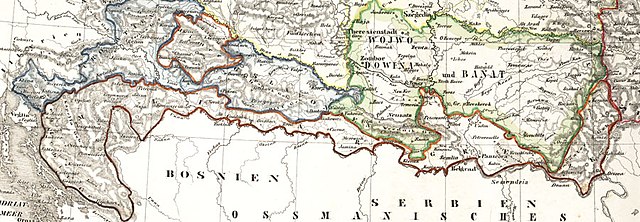Content deleted Content added
Line 58: }} The '''Military Frontier''' was a province straddling the southern borderland of the [[Habsburg Monarchy]] and later the [[Austro-Hungarian Empire]], which acted as the ''[[cordon sanitaire]]'' against incursions from the [[Ottoman Empire]]. When created in the 16th century by [[Ferdinand I, Holy Roman Emperor|Ferdinand I]], it was divided into two districts under special military administration: the [[Croatian Military Frontier]] and the [[Slavonian Military Frontier]], initially under jurisdiction of the [[Croatian Parliament|Croatian Sabor]] and [[Ban of Croatia|ban]]. In 1627, the ==Name== Line 84: Despite the financial support of the Inner Austrian nobility, the financing of the Military Frontier was not efficient enough. The military leadership in Graz decided to try solutions other than mercenary units. In the 1630s the Imperial Court decided to give land and certain privileges to immigrants into the Frontier (the [[uskok]] guerrillas as well as refugees from Ottoman-controlled lands) at the area of [[Žumberak]], and in return they would serve in the Imperial army. The remaining local population was also encouraged to remain by receiving the status of free peasants (rather than [[serf]]s) and other privileges. These new units were organized into ten or more ''[[voivodeship]]s'' per each captaincy. In 1627, the Military Frontier was removed from the control of the In November 1630, the Emperor [[Ferdinand II, Holy Roman Emperor|Ferdinand II]] proclaimed the so-called ''[[Statuta Valachorum]]'' ("Vlach Statute"),<ref>{{cite web|url=http://www.skdprosvjeta.com/page.php?id=33}} {{better source|date=June 2015}}</ref> which regulated the status of so-called Vlach settlers (which included [[Croats]], [[Serbs]] and [[Vlachs]]) from the Ottoman Empire with regard to military command, their obligations and rights to internal self-administration. Over time, the population of the Frontier (as it was then) became mixed between the autochthonous [[Croats]] and Croatian serfs who had fled the Ottoman territories, and the numerous minority of [[Serbs|Serb]] and [[Vlachs|Vlach]] (who were later assimilated into [[Croats]] and [[Serbs]]){{fact|date=July 2015}} {{dubious|date=July 2015}} refugees who strove to expand their rights as a major contributor in the defense of the land. By creating the new military class in the Frontier, the territory of the Frontier eventually became fully detached from the Croatian Parliament and the [[ban (title)|ban]]. The Territory of the Frontier had a large Serb population, who fled from their south-eastern lands, and tried to fight the Ottoman forces, making a refuge in Habsburg Croatia. As freedom of faith was granted to them, the Orthodox faith was preserved in spite of their living in a Catholic country. Eventually, the whole population of the Military Frontier became professional soldiers who served the Empire on several fronts and through many European wars, even after the relaxation of the Ottoman threat. | |||
 Article Images
Article Images